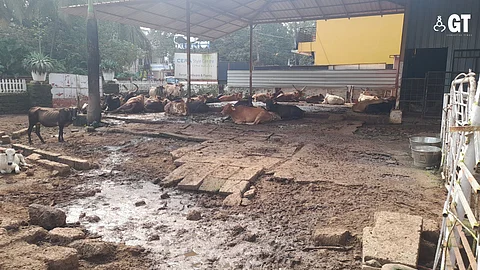

In 2005 when Atul Sarin decided to relocate from the United Kingdom to Goa, he invested in a house in Siolim. It was meant to be a residence and double up as a guest house. But fate took him down a different path.
As he settled in his new home, he came across a stray dog who was sheltering in ATM just opposite Atul’s new house. They developed a connection and soon, what was to be a guest house is today a rescue home for animals.
In any essay written in ‘The Book of Dog’ Atul writes, “Prashant the shopkeeper said a foreigner was looking after her (a dog), but had to leave the country. She left Rs 10,000 with a family and lots of food for them to look after her but they threw her out. She started sleeping outside the shop, which then became the ATM. I was the one who named her Siddhi, Gopal said.”
Fifteen years later Welfare for Animals in Goa (WAG) was born. “Rest in peace my friend; I will never forget you,” concludes the essay, but the story for Atul continues.
“What touched me is the conditions in which animals in India survive. They know who is going to give them food, they do not hold any grudge but are always grateful for help given to them,” is what Atul says, based on his experience, as rescued dogs roam around his residence.
The issue in Goa is not just of abandoned dogs and cattle but that are injured are left to die in pain. “It is our fault for domesticating animals around 5,000 years ago. We use dogs for security and cows for milk and abandon them when it does not suit us,” laments Atul, who believes his happiness stems from the good he has been doing for these animals.
Now, with years of experience of looking after injured and abandoned animals, Atul thinks their love, as compared to that of humans, is ‘unconditional’.
“If you come home late from work the dogs will sing with joy but the same will not be how family members react,” reasons Atul, who believes the central force of happiness is doing good to others.
“If we humans understood and shared this unconditional love, we would have been living in a better world,” observes Atul, who thinks it is safer to call him a probable agnostic.
“I was brought up as a Hindu but I respect all religions. Religion is how human beings interpret it to suit themselves. Amongst the many planets, ours is the only one that we see life on and so there must be something that has created us,” says Atul, whilst not ruling out the possibility of a power that many call ‘Almighty’.
“We human beings will destroy ourselves with the greed we are creating. Great people have spoken of animals and it is obvious that if we do not treat them well we will never be able to treat others with respect,” reasons Atul.
“If we can do it for animals, it will automatically happen with humans because humans are more important. In this 21st century, we have enough resources to help humans and animals. If we can send rockets to the moon, we can definitely help both,” rationalises Atul.
We human beings will destroy ourselves with the greed we are creating. Great people have spoken of animals and it is obvious that if we do not treat them well we will never be able to treat others with respect
Atul believes what he is doing is ‘seva’ which he believes means, ‘hands on helping’. Meditation, according to him, helps one overcome problems faced daily and ‘seva’ goes beyond it.
Indeed, many more years down the line, WAG is not seeing just happy animals, but happiness in the eyes of Atul and all who collaborate with him.